2022年人教版中考英语二轮复习第八节 动 词 时态课件(共62张PPT)
文档属性
| 名称 | 2022年人教版中考英语二轮复习第八节 动 词 时态课件(共62张PPT) |  | |
| 格式 | pptx | ||
| 文件大小 | 903.1KB | ||
| 资源类型 | 教案 | ||
| 版本资源 | 人教新目标(Go for it)版 | ||
| 科目 | 英语 | ||
| 更新时间 | 2022-05-25 15:52:49 | ||
图片预览

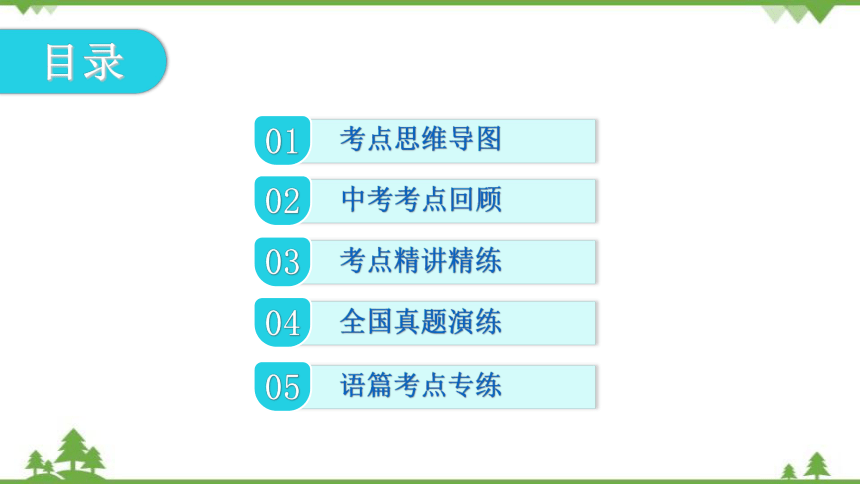
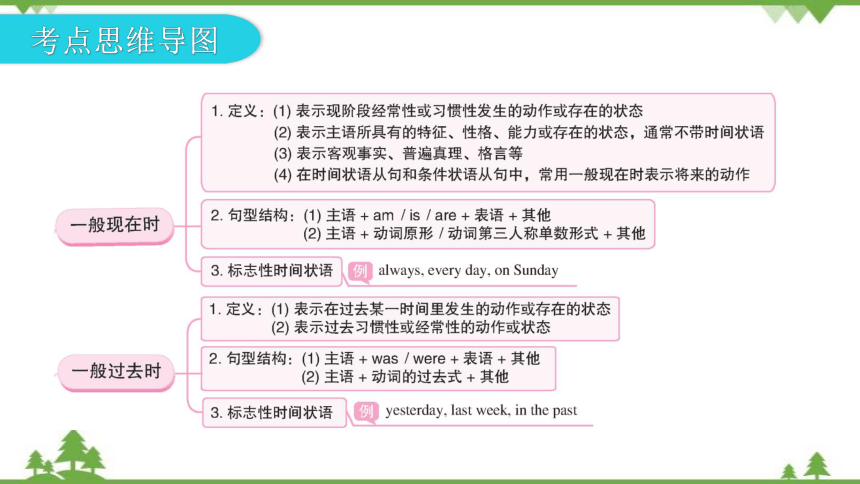
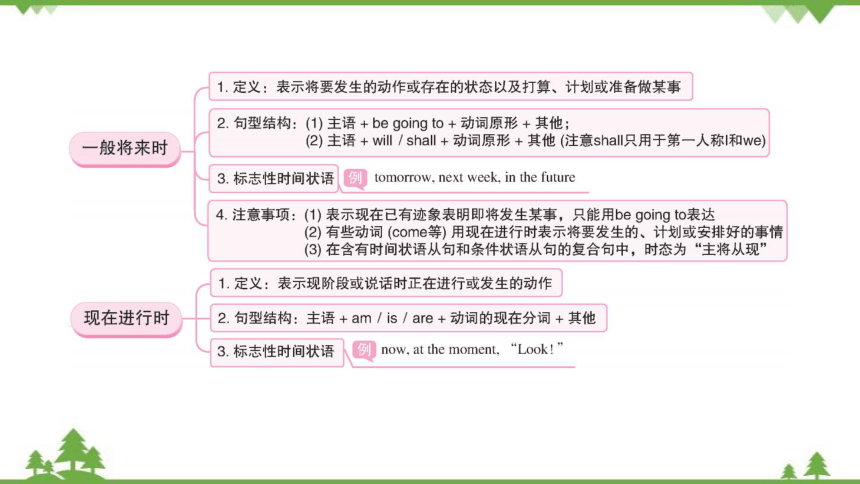
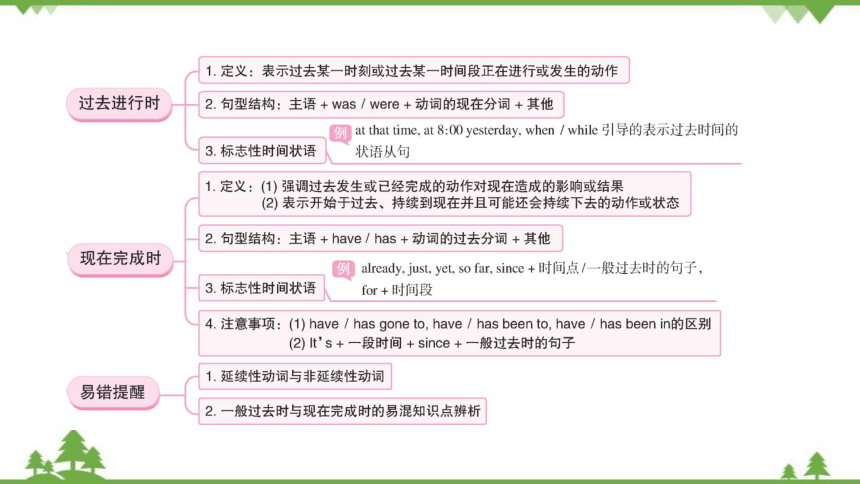
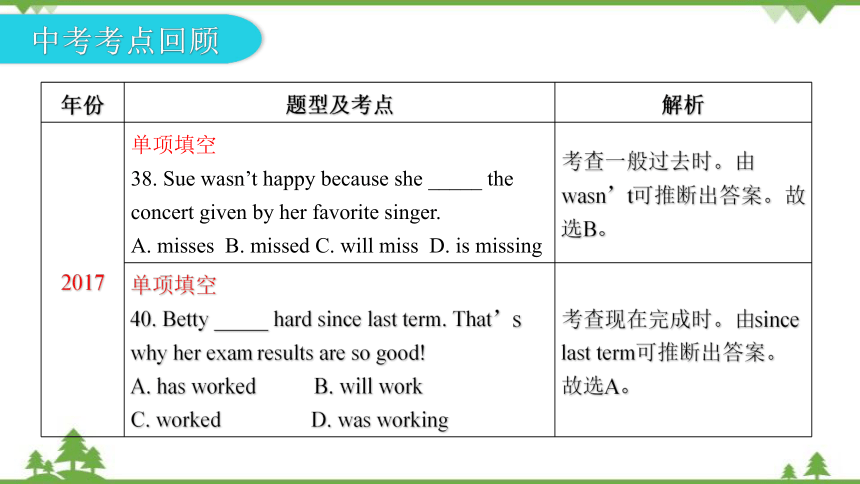
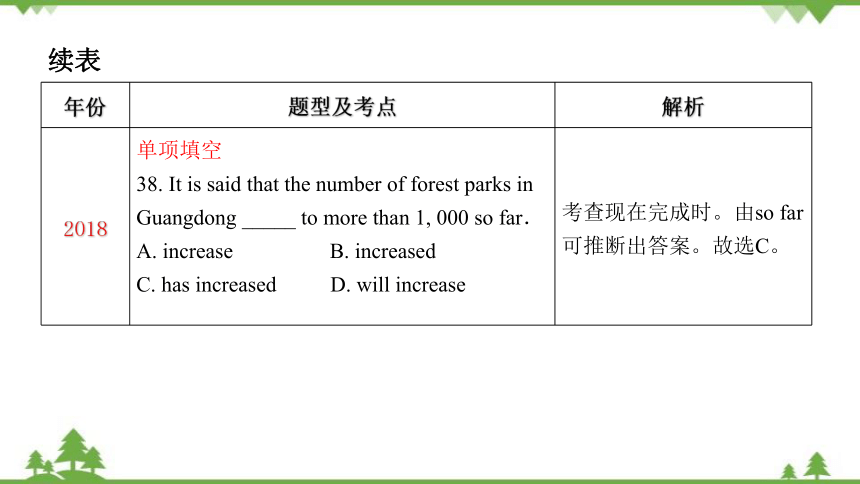
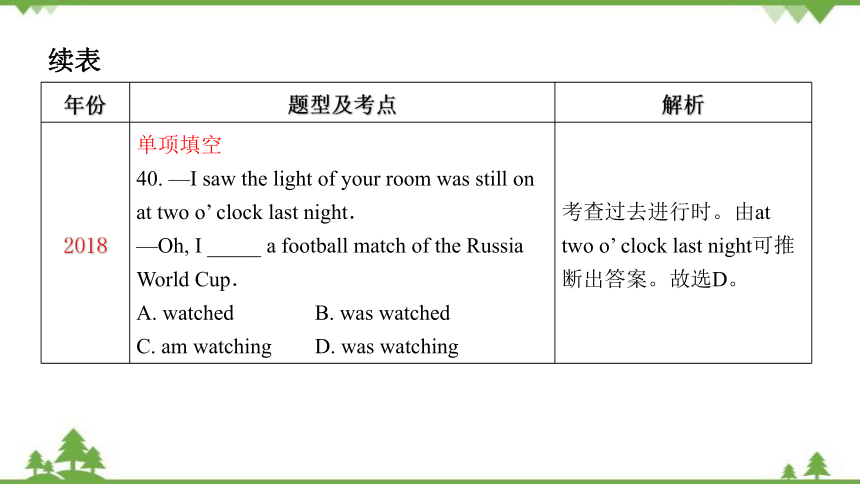
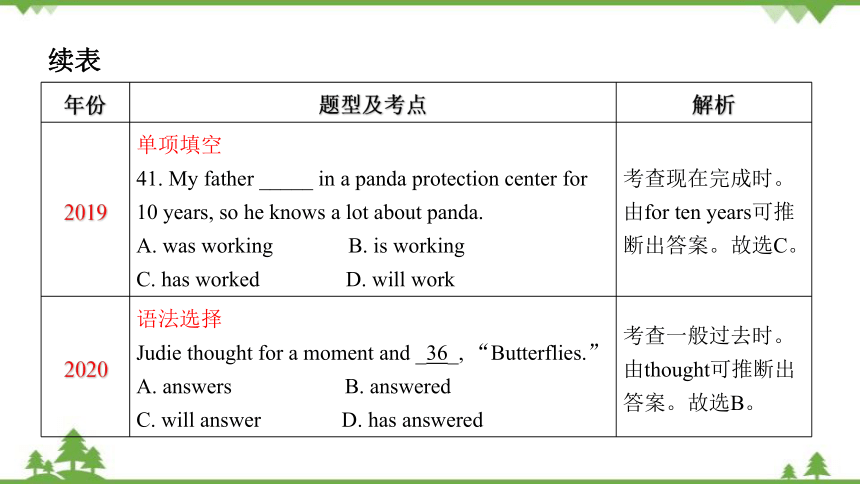
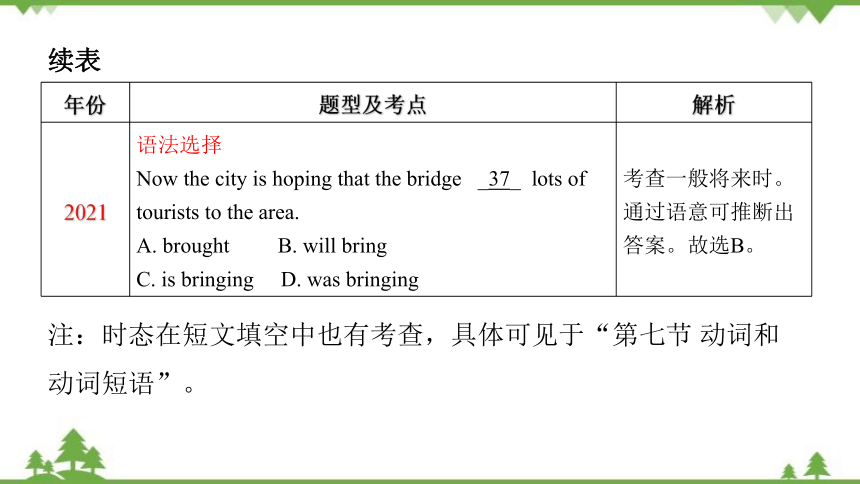
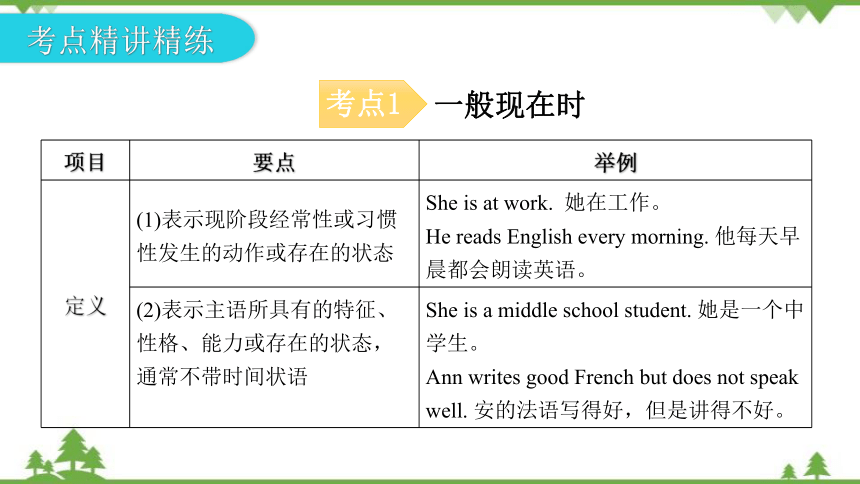
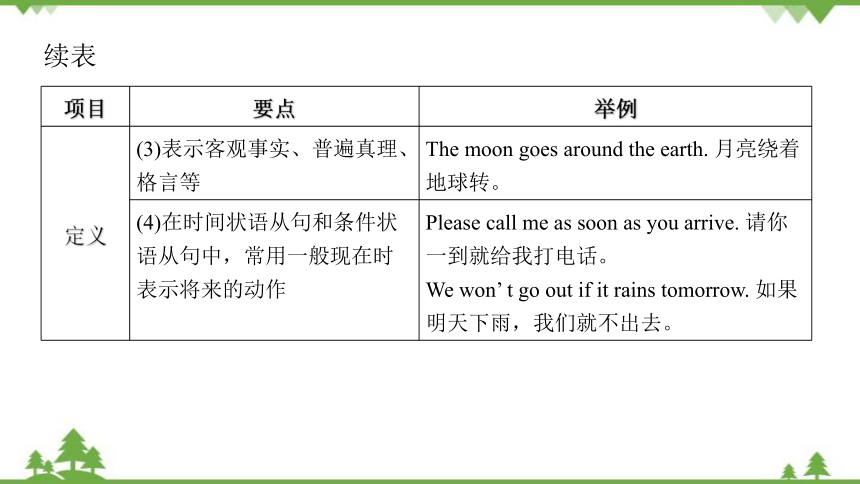
文档简介
(共62张PPT)
第一部分 基于语义的语法知识篇
第八节 动 词 时 态
目录
01
考点思维导图
02
中考考点回顾
03
考点精讲精练
04
全国真题演练
05
语篇考点专练
考点思维导图
中考考点回顾
年份 题型及考点 解析
2017 单项填空 38. Sue wasn’t happy because she _____ the concert given by her favorite singer. A. misses B. missed C. will miss D. is missing 考查一般过去时。由wasn’t可推断出答案。故选B。
单项填空 40. Betty _____ hard since last term. That’s why her exam results are so good! A. has worked B. will work C. worked D. was working 考查现在完成时。由since last term可推断出答案。故选A。
年份 题型及考点 解析
2018 单项填空 38. It is said that the number of forest parks in Guangdong _____ to more than 1, 000 so far. A. increase B. increased C. has increased D. will increase 考查现在完成时。由so far可推断出答案。故选C。
续表
年份 题型及考点 解析
2018 单项填空 40. —I saw the light of your room was still on at two o’ clock last night. —Oh, I _____ a football match of the Russia World Cup. A. watched B. was watched C. am watching D. was watching 考查过去进行时。由at two o’ clock last night可推断出答案。故选D。
续表
年份 题型及考点 解析
2019 单项填空 41. My father _____ in a panda protection center for 10 years, so he knows a lot about panda. A. was working B. is working C. has worked D. will work 考查现在完成时。由for ten years可推断出答案。故选C。
2020 语法选择 Judie thought for a moment and _36_, “Butterflies.” A. answers B. answered C. will answer D. has answered 考查一般过去时。由thought可推断出答案。故选B。
续表
年份 题型及考点 解析
2021 语法选择 Now the city is hoping that the bridge _37_ lots of tourists to the area. A. brought B. will bring C. is bringing D. was bringing 考查一般将来时。通过语意可推断出答案。故选B。
续表
注:时态在短文填空中也有考查,具体可见于“第七节 动词和动词短语”。
考点精讲精练
考点1
一般现在时
项目 要点 举例
定义 (1)表示现阶段经常性或习惯性发生的动作或存在的状态 She is at work. 她在工作。
He reads English every morning. 他每天早晨都会朗读英语。
(2)表示主语所具有的特征、性格、能力或存在的状态,通常不带时间状语 She is a middle school student. 她是一个中学生。
Ann writes good French but does not speak well. 安的法语写得好,但是讲得不好。
续表
项目 要点 举例
定义 (3)表示客观事实、普遍真理、格言等 The moon goes around the earth. 月亮绕着地球转。
(4)在时间状语从句和条件状语从句中,常用一般现在时表示将来的动作 Please call me as soon as you arrive. 请你一到就给我打电话。
We won’ t go out if it rains tomorrow. 如果明天下雨,我们就不出去。
续表
项目 要点 举例
句型 结构 (1)主语+am/is/are+表语+其他 (2)主语+动词原形/动词第三人称单数形式+其他 I am (not) a nurse. 我(不)是一名护士。
Are you a nurse 你是一名护士吗?
I (don’t) often go to school by bike. 我(不)经常骑车上学。
Do you often go to school by bike 你经常骑车上学吗?
标志性 时间状语 always, usually, often, sometimes, seldom, hardly, never, every day/week/month/year …, once/twice … a week, on Sunday/Monday …
( )1. The zebra eats grass, but it _____ eat meat.
A.doesn’t B.didn’t C.don’t D. isn’t
( )2. The teacher told us the earth _____ the sun.
A. goes around B. went around
C. is going around D. would go around
A
A
( )3. She also has her own YouTube channel and ____ over a million hits a year.
A. get B. gets C. got D. has got
( )4. Almost everyone _____ WeChat nowadays, even the old.
A. play B. plays C. was playing D. played
( )5. —Tell Daniel about the news when he _____, John.
—OK, I will.
A. comes B. will come C. would come D. came
B
B
A
考点2
一般过去时
项目 要点 举例
定义 (1)表示在过去某一时间里发生的动作或存在的状态 The little boy was born in 2010. 那个小男孩出生于2010年。
You arrived late yesterday. 昨天你迟到了。
(2)表示过去习惯性或经常性的动作或状态 She often went to the park last year. 去年她经常去公园。
续表
项目 要点 举例
句型结构 (1)主语+was/were+表语+其他 (2)主语+动词的过去式+其他 They were (not) in the classroom just now. 刚才他们(不)在教室。
Were they in the classroom just now?刚才他们在教室吗?
We didn’ t play/played soccer last night. 昨晚我们(没)踢足球。
Did you play soccer last night 昨晚你们踢足球了吗?
标志性 时间状语 时间段+ago(two days ago …), yesterday, the day before yesterday(前天), last night/week/month/year …, in 1989, just now, in the past(在过去), the other day(前几天)…
( )1. I’ve just returned from my trip to Beijing. I _____ many interesting places there.
A. visit B. visited C. will visit D. am visiting
( )2. —Where does Bill live
—He _____ me his address, but I can’t remember it now.
A. tells B. told C. is telling D. will tell
B
B
( )3. Last week Vivian _____ a dress for her mother with her first-month salary.
A. buy B. bought C. will buy D. would buy
( )4. —Alicia is not coming for the party tonight.
—But she _____.
A. promises B. promised
C. will promise D. had promised
B
B
( )5. —When _____ you _____ your old friend, Tom
—The day before yesterday.
A. will; visit B. do; visit C. have; visit D. did; visit
D
考点3
一般将来时
项目 要点 举例
定义 表示将要发生的动作或存在的状态以及打算、计划或准备做某事 I hope my dream will come true one day. 我希望有一天我的梦想会实现。
We are going to meet at the school gate tomorrow. 明天我们打算在学校大门口见面。
续表
项目 要点 举例
句型结构 (1)主语+be going to+动词原形+其他 (2)主语+will/shall+动词原形+其他 【注意】shall只用于第一人称I和we She is (not) going to fly a kite this Sunday.这个星期天她(不)去放风筝。
Is she going to fly a kite this Sunday 这个星期天她去放风筝吗?
We will (not) help you. 我们(不)会帮你。
Will you help me?你们会帮我吗?
标志性 时间状语 tomorrow, the day after tomorrow(后天), next day/week/month/year …,soon, in+时间段(一段时间后), in the future, in 2025 …
续表
项目 要点 举例
注意事项 (1)表示现在已有迹象表明即将发生某事,只能用be going to表达 例 Look at the dark clouds. I think it is going to rain. 看那些乌云,我觉得要下雨了。(乌云聚集预示着将要下雨,所以用be going to) (2)有些动词(arrive, come, go, leave等)用现在进行时可以表示将要发生的、计划或安排好的事情 例 According to the app Chelaile, the bus is coming. 根据应用程序“车来了”,公交车要到了。(“车来了”应用程序显示公交车即将到来,但实际未到)
续表
项目 要点 举例
注意 事项 (3)在含有时间状语从句和条件状语从句的复合句中,主句是一般将来时,从句用一般现在时来代替将来时,即“主将从现” 例 We will go to the park if it doesn’ t rain tomorrow. 如果明天不下雨,我们将去公园。(“我们将去公园”是一般将来时,根据“主将从现”,从句用一般现在时)
( )1. Look at the bright side of life, and imagine that you _____ a happy and successful future.
A. had B. will have C. have D. have had
( )2. There _____ an English show this weekend. Shall we go and watch it
A. are going to be B. will be
C. will have D. is going to have
B
B
( )3. —I will go swimming this afternoon, Daming.
—If you go, so _____ I.
A.will B.do C.am D.have
( )4. Even if you learn something well, you _____ it unless you use it.
A. forget B. forgot C. have forgotten D. will forget
( )5. —Honey, where are you
—I _____. Just let me put on my shoes.
A. come B. came C. have come D. am coming
A
D
D
考点4
现在进行时
项目 要点 举例
定义 表示现阶段或说话时正在进行或发生的动作 I am listening to my teacher now. 现在我正在听老师讲课。
句型结构 主语+am/is/are+动词的现在分词+其他 We are (not) watching TV now. 现在我们(不是)在看电视。
Are you watching TV now 现在你们在看电视吗?
标志性 时间状语 now,right now,at the moment …,以及提示词“Look!” “Listen!”…
( )1. Look! The little cat _____ on the grass. How lovely it is!
A. lies B. lay C. has lain D. is lying
( )2. Sorry, you can’t take the dictionary away, Vicky. I ___ it.
A. used B. am using C. have used D. was using
( )3. —Anita, would you please take out the rubbish
—Just a minute, Mom. I _____ a phone call.
A. make B. made C. am making D. has made
D
B
C
( )4. The spirit of ox(牛)_____ an important role for China’s development this year.
A. is playing B. was playing C. played D. has played
( )5. Students in Class One _____ for the singing competition at the moment.
A. prepare B. are preparing
C. prepared D. are going to prepare
A
B
考点5
过去进行时
项目 要点 举例
定义 表示过去某一时刻或过去某一时间段正在进行或发生的动作 My mother was cooking when I came back home last Friday. 上周五当我到家时,我妈妈正在做饭。
句型结构 主语+was/were+动词的现在分词+其他 I was (not) watching TV at 8:00 yesterday morning.
昨天上午8点,我(不是)在看电视。
Are you watching TV at 8:00 yesterday morning 昨天上午8点,你在看电视吗?
标志性时间状语 at that time, at that moment, then, (at) this time yesterday, at 8:00 yesterday, when/while引导的表示过去时间的状语从句
( )1. We _____ about a comedy this time yesterday.
A. are talking B. will talk
C. were talking D. have talked
( )2. —Do you know where your brother is, Mark
—Sorry. I _____ about a question and didn’t hear what you had said.
A. was thinking B. will think
C. am thinking D. was thought
C
A
( )3. —Alice, you weren’ t in the classroom at four o’ clock yesterday afternoon.
—I_____ English grammar with Linda in the library at that time.
A. go over B. went over
C. am going over D. was going over
D
( )4. I _____ with my father at that time. I didn’ t know what _____.
A. was swimming; was happening
B. am swimming; has happened
C. was swimming; happens
D. swam; was happening
( )5. I _____ books in the library when the rainstorm came.
A.read B.reads C.am reading D.was reading
A
D
考点6
现在完成时
项目 要点 举例
定义 (1)强调过去发生或已经完成的动作对现在造成的影响或结果 I have had lunch already. 我已经吃过午饭了。
(2)表示开始于过去、持续到现在并且可能还会持续下去的动作或状态 The film has been on for ten minutes. 这部电影已经开始10分钟了。
续表
项目 要点 举例
句型结构 主语+have/has+动词的过去分词+其他 He has (not) finished his homework. 他(没有)完成他的家庭作业。
Has he finished his homework 他完成他的家庭作业了吗?
标志性时间状语 (1)already,just,yet,ever,never,before,so far/by now,recently/lately,in the past/last few days/weeks/months/years …,twice/three times … (2)since+时间点/一般过去时的句子(自从……到现在),for+时间段
续表
项目 要点 举例
注意事项 (1)区别: ①have/has gone to 去了某地(人现在还没回来) 例 —Where is your father 你父亲在哪里? —He has gone to Shanghai. 他去了上海。 ②have/has been to 去过某地(人现在已经回来了) 例 He has been to Shanghai twice. 他去过上海两次。 ③have/has been in 在某地已经多长时间了(通常与for/since连用) 例 He has been in Dongguan for three years. 他来东莞3年了。
续表
项目 要点 举例
注意事项 (2)“It’ s+一段时间+since+一般过去时的句子”意为“自从……到现在已经多长时间了” 例 It’ s three years since he came to China. 自从他来中国到现在已经有3年了。
( )1. It’s nice to see you again. We _____ each other since 2014.
A. won’t see B. don’t see C. haven’t seen D. didn’t see
( )2. —Mom, where is David
—He _____ to see the science fiction film Back to the Future.
A. is going B. goes C. has gone D. was going
C
C
( )3. —Yunnan is very beautiful. I _____ there last year.
—I _____ there twice.
A. went; have gone B. went; have been
C. have gone; went D. have been; went
( )4. —The book is popular. _____ you _____ it yet
—Yes, I have.
A. Are; reading B. Were; reading
C. Have; read D. Will; read
B
C
( )5. Over the past few months, Chinese COVID-19 vaccines (疫苗) _____ in many other countries.
A.have arrived B.arrived C.will arrive D.had arrived
A
1. 延续性动词与非延续性动词
非延续性动词用于表示一次性的动作,如需要和表示一段时间的状语(for+时间段,since+时间点,how long等)连用,应转换为延续性动词。常见的非延续性动词向延续性动词的转换如下:
动词变动词 buy→have borrow/lend→keep
become→be catch a cold→have a cold
变为 “be+adj./ adv./prep.” begin/start→be on go→be off
close/open→be closed/be open leave→be away from
come back/go back→be back marry/get married→be married
come out/go out→be out fall asleep→be asleep
die→be dead put on→be in/wear
finish/end→be over join→be in/be a member of
get up→be up
例 The old man died 4 years ago. = The old man has been dead for 4 years. 那位老人死了4年了。
He joined the Party 3 years ago. = He has been in the Party for 3 years. = He has been a Party member for 3 years. 他入党3年了。
I bought the book 5 days ago. = I have had the book for 5 days. 这本书我刚买5天。
2. 一般过去时与现在完成时的易混知识点辨析
一般过去时:表示过去发生的动作或状态,与现在无关。
现在完成时:表示过去发生的某一动作对现在造成的影响,强调现在的情况。
例 He has worked here since 2010. 自2010年以来他就在这里工作。(他现在还在这里工作)
He worked here in 2010. 2010年,他在这里工作。(他当时在这里工作,现在不一定还在这里工作)
( )1. You’ve _____ the computer for ten years and it doesn’t work well. Why don’t you buy a new one
A. bought B. had C. have D. borrowed
( )2. It _____ 100 years since the Communist Party of China _____.
A. was; was founded B. has been; was founded
C. has been; founded D. was; founded
B
B
( )3. —Have you been to the shopping mall
—No. Although it _____ for more than half a year, I’m far too busy to go there.
A. has started B. has been on
C. has been open D. has opened
( )4. William Shakespeare _____ for about 400 years, but his works still have great influence today.
A. died B. has died C. was dead D. has been dead
C
D
( )5. We _____ good friends since we _____ the same club.
A. have been; joined B. have been; have joined
C. were; joined D. are; have joined
A
全国真题演练
( )1. —Lily, what do you usually do after school
—I _____ exercise with my friends. (2021 北京)
A. do B. did C. will do D. was doing
( )2. —There _____ a basketball game against Class Two this Sunday.
—I see. I will come and cheer you on. (2021 乐山)
A. will have B. is going to be C. is going to have
A
B
( )3. —Did you see Dorothy She just came back from abroad.
—Yes. But she _____ someone, so I nodded to her and went away. (2021 内蒙古)
A.phones B.is phoning C.was phoning D.has phoned
( )4. —I wonder if Li Hua _____ to the hospital to receive COVID-19 vaccinations (疫苗接种).
—I’m sure he will if he _____ time. (2021 达州)
A. goes; will have B. will go; has
C. will go; will have D. goes; has
C
B
( )5. —COVID-19 is spreading wildly in India. Take care!
—Yes. More than 300,000 people _____ there. (2021 邵阳)
A. die B. are dying C. have died
( )6. My parents and I _____ trees last Sunday. (2021 北京)
A. plant B. will plant C. re planting D. planted
C
D
( )7. —Why are you in such a hurry
—Because the class _____ for 10 minutes. (2021 襄阳)
A. has been on B. has begun C. is on D. begins
( )8. —Dad, I can’t find my school ID card. Did you see it
—No, I didn’t. I think you _____ it! (2021 黄冈)
A. lose B. will lose C. have lost D. are losing
A
C
( )9. —Mom, where is Dad
—He _____ the supermarket. (2020 丹东)
A. was going to B. has gone to
C. has been to D. is going to
( )10. —Be quick, Sara! The taxi is waiting for us outside.
—A moment, please. I _____ some visitors our products. (2020营口)
A. showed B. am showing C. was showing D. show
B
B
一、语法选择
A new singing competition show _1_ popular with all the people especially the students. It is held in the summer vacation, so students _2_ enough time to enjoy it. It’ s a large music show in China. It’ s said that this program is also the one which _3_ the voice as the only ruler. Here is some information about one of the power singers, Li.
语篇考点专练
is
have
regards
Li, a Chinese Australian, is 26 years old. He is heavy and his family is very poor, but he _4_ very well. Although he can sing so well, because of his appearance, he _5_ refused many times before. But this didn’t stop him, he believed he _6_ one day. And he was sure that he would be accepted. Everything came to him who _7_ for the moment all the time. The year 2015 was his lucky year, he _8_ a famous singer after he sang the song
sings
was
would succeed
was waiting
became
love is over in the TV show. What he did encourages me a lot. I _9_ to improve my English, but I gained a little. Now I know that I should try again. Nothing _10_ difficult if you put your heart into it. I am sure I will succeed if I try my best.
tried
will be
( )1. A. is B. was C. will be D. has been
( )2. A. had B. have C. will have D. has had
( )3. A. regards B. regarded
C. will regard D. has regarded
( )4. A. sang B. sings C. will sing D. has sung
( )5. A. is B. will be C. was D. has been
A
B
A
B
C
( )6. A. succeeds B. succeeded
C. would succeed D. was succeeding
( )7. A. waits B. waited C. will wait D. was waiting
( )8. A. becomes B. is becoming
C. became D. will become
( )9. A. try B. tried C. will try D. am trying
( )10. A. are B. was C. will be D. has been
C
D
C
B
C
二、短文填空
China lies in the east of Asia. It _1_ one of the oldest countries in the world. Ancient China began about 5,000 years ago. The first villages were built at that time, but no one _2_ for sure the exact date when ancient China started.
Ancient China was ruled by many emperors from different dynasties. The first emperor _3_ Qin Shihuang. He _4_ the six
is
knows
was
beat
Chinese kingdoms through many wars and _5_ up a big China in 221 BC. After that, he _6_ the Great Wall to keep the enemies outside. What we must mention in ancient China are the two dynasties: the Han Dynasty and the Tang Dynasty. People in these dynasties _7_ a long and peaceful time. They were rich and lived a happy life.
But ancient China was very isolated (孤独的) at that time in the rest of the world. This isolation was reflected in the creation of
set
built
had
the Great Wall. Sometimes, you could feel the isolation from the name of some famous buildings, too. For example, the emperors of the Ming Dynasty and the Qing Dynasty _8_ in a palace which is called the Forbidden City (紫禁城). Ordinary people _9_ not allowed to go in. However, the Silk Road was formed to open trade between China and other countries. It _10_ ancient China a lot to communicate with other countries.
lived
were
helped
1. _____________ 2. ______________
3. _____________ 4. ______________
5. _____________ 6. ______________
7. _____________ 8. ______________
9. _____________ 10. _____________
is
knows
was
beat
set
built
had
lived
were
helped
谢 谢!
第一部分 基于语义的语法知识篇
第八节 动 词 时 态
目录
01
考点思维导图
02
中考考点回顾
03
考点精讲精练
04
全国真题演练
05
语篇考点专练
考点思维导图
中考考点回顾
年份 题型及考点 解析
2017 单项填空 38. Sue wasn’t happy because she _____ the concert given by her favorite singer. A. misses B. missed C. will miss D. is missing 考查一般过去时。由wasn’t可推断出答案。故选B。
单项填空 40. Betty _____ hard since last term. That’s why her exam results are so good! A. has worked B. will work C. worked D. was working 考查现在完成时。由since last term可推断出答案。故选A。
年份 题型及考点 解析
2018 单项填空 38. It is said that the number of forest parks in Guangdong _____ to more than 1, 000 so far. A. increase B. increased C. has increased D. will increase 考查现在完成时。由so far可推断出答案。故选C。
续表
年份 题型及考点 解析
2018 单项填空 40. —I saw the light of your room was still on at two o’ clock last night. —Oh, I _____ a football match of the Russia World Cup. A. watched B. was watched C. am watching D. was watching 考查过去进行时。由at two o’ clock last night可推断出答案。故选D。
续表
年份 题型及考点 解析
2019 单项填空 41. My father _____ in a panda protection center for 10 years, so he knows a lot about panda. A. was working B. is working C. has worked D. will work 考查现在完成时。由for ten years可推断出答案。故选C。
2020 语法选择 Judie thought for a moment and _36_, “Butterflies.” A. answers B. answered C. will answer D. has answered 考查一般过去时。由thought可推断出答案。故选B。
续表
年份 题型及考点 解析
2021 语法选择 Now the city is hoping that the bridge _37_ lots of tourists to the area. A. brought B. will bring C. is bringing D. was bringing 考查一般将来时。通过语意可推断出答案。故选B。
续表
注:时态在短文填空中也有考查,具体可见于“第七节 动词和动词短语”。
考点精讲精练
考点1
一般现在时
项目 要点 举例
定义 (1)表示现阶段经常性或习惯性发生的动作或存在的状态 She is at work. 她在工作。
He reads English every morning. 他每天早晨都会朗读英语。
(2)表示主语所具有的特征、性格、能力或存在的状态,通常不带时间状语 She is a middle school student. 她是一个中学生。
Ann writes good French but does not speak well. 安的法语写得好,但是讲得不好。
续表
项目 要点 举例
定义 (3)表示客观事实、普遍真理、格言等 The moon goes around the earth. 月亮绕着地球转。
(4)在时间状语从句和条件状语从句中,常用一般现在时表示将来的动作 Please call me as soon as you arrive. 请你一到就给我打电话。
We won’ t go out if it rains tomorrow. 如果明天下雨,我们就不出去。
续表
项目 要点 举例
句型 结构 (1)主语+am/is/are+表语+其他 (2)主语+动词原形/动词第三人称单数形式+其他 I am (not) a nurse. 我(不)是一名护士。
Are you a nurse 你是一名护士吗?
I (don’t) often go to school by bike. 我(不)经常骑车上学。
Do you often go to school by bike 你经常骑车上学吗?
标志性 时间状语 always, usually, often, sometimes, seldom, hardly, never, every day/week/month/year …, once/twice … a week, on Sunday/Monday …
( )1. The zebra eats grass, but it _____ eat meat.
A.doesn’t B.didn’t C.don’t D. isn’t
( )2. The teacher told us the earth _____ the sun.
A. goes around B. went around
C. is going around D. would go around
A
A
( )3. She also has her own YouTube channel and ____ over a million hits a year.
A. get B. gets C. got D. has got
( )4. Almost everyone _____ WeChat nowadays, even the old.
A. play B. plays C. was playing D. played
( )5. —Tell Daniel about the news when he _____, John.
—OK, I will.
A. comes B. will come C. would come D. came
B
B
A
考点2
一般过去时
项目 要点 举例
定义 (1)表示在过去某一时间里发生的动作或存在的状态 The little boy was born in 2010. 那个小男孩出生于2010年。
You arrived late yesterday. 昨天你迟到了。
(2)表示过去习惯性或经常性的动作或状态 She often went to the park last year. 去年她经常去公园。
续表
项目 要点 举例
句型结构 (1)主语+was/were+表语+其他 (2)主语+动词的过去式+其他 They were (not) in the classroom just now. 刚才他们(不)在教室。
Were they in the classroom just now?刚才他们在教室吗?
We didn’ t play/played soccer last night. 昨晚我们(没)踢足球。
Did you play soccer last night 昨晚你们踢足球了吗?
标志性 时间状语 时间段+ago(two days ago …), yesterday, the day before yesterday(前天), last night/week/month/year …, in 1989, just now, in the past(在过去), the other day(前几天)…
( )1. I’ve just returned from my trip to Beijing. I _____ many interesting places there.
A. visit B. visited C. will visit D. am visiting
( )2. —Where does Bill live
—He _____ me his address, but I can’t remember it now.
A. tells B. told C. is telling D. will tell
B
B
( )3. Last week Vivian _____ a dress for her mother with her first-month salary.
A. buy B. bought C. will buy D. would buy
( )4. —Alicia is not coming for the party tonight.
—But she _____.
A. promises B. promised
C. will promise D. had promised
B
B
( )5. —When _____ you _____ your old friend, Tom
—The day before yesterday.
A. will; visit B. do; visit C. have; visit D. did; visit
D
考点3
一般将来时
项目 要点 举例
定义 表示将要发生的动作或存在的状态以及打算、计划或准备做某事 I hope my dream will come true one day. 我希望有一天我的梦想会实现。
We are going to meet at the school gate tomorrow. 明天我们打算在学校大门口见面。
续表
项目 要点 举例
句型结构 (1)主语+be going to+动词原形+其他 (2)主语+will/shall+动词原形+其他 【注意】shall只用于第一人称I和we She is (not) going to fly a kite this Sunday.这个星期天她(不)去放风筝。
Is she going to fly a kite this Sunday 这个星期天她去放风筝吗?
We will (not) help you. 我们(不)会帮你。
Will you help me?你们会帮我吗?
标志性 时间状语 tomorrow, the day after tomorrow(后天), next day/week/month/year …,soon, in+时间段(一段时间后), in the future, in 2025 …
续表
项目 要点 举例
注意事项 (1)表示现在已有迹象表明即将发生某事,只能用be going to表达 例 Look at the dark clouds. I think it is going to rain. 看那些乌云,我觉得要下雨了。(乌云聚集预示着将要下雨,所以用be going to) (2)有些动词(arrive, come, go, leave等)用现在进行时可以表示将要发生的、计划或安排好的事情 例 According to the app Chelaile, the bus is coming. 根据应用程序“车来了”,公交车要到了。(“车来了”应用程序显示公交车即将到来,但实际未到)
续表
项目 要点 举例
注意 事项 (3)在含有时间状语从句和条件状语从句的复合句中,主句是一般将来时,从句用一般现在时来代替将来时,即“主将从现” 例 We will go to the park if it doesn’ t rain tomorrow. 如果明天不下雨,我们将去公园。(“我们将去公园”是一般将来时,根据“主将从现”,从句用一般现在时)
( )1. Look at the bright side of life, and imagine that you _____ a happy and successful future.
A. had B. will have C. have D. have had
( )2. There _____ an English show this weekend. Shall we go and watch it
A. are going to be B. will be
C. will have D. is going to have
B
B
( )3. —I will go swimming this afternoon, Daming.
—If you go, so _____ I.
A.will B.do C.am D.have
( )4. Even if you learn something well, you _____ it unless you use it.
A. forget B. forgot C. have forgotten D. will forget
( )5. —Honey, where are you
—I _____. Just let me put on my shoes.
A. come B. came C. have come D. am coming
A
D
D
考点4
现在进行时
项目 要点 举例
定义 表示现阶段或说话时正在进行或发生的动作 I am listening to my teacher now. 现在我正在听老师讲课。
句型结构 主语+am/is/are+动词的现在分词+其他 We are (not) watching TV now. 现在我们(不是)在看电视。
Are you watching TV now 现在你们在看电视吗?
标志性 时间状语 now,right now,at the moment …,以及提示词“Look!” “Listen!”…
( )1. Look! The little cat _____ on the grass. How lovely it is!
A. lies B. lay C. has lain D. is lying
( )2. Sorry, you can’t take the dictionary away, Vicky. I ___ it.
A. used B. am using C. have used D. was using
( )3. —Anita, would you please take out the rubbish
—Just a minute, Mom. I _____ a phone call.
A. make B. made C. am making D. has made
D
B
C
( )4. The spirit of ox(牛)_____ an important role for China’s development this year.
A. is playing B. was playing C. played D. has played
( )5. Students in Class One _____ for the singing competition at the moment.
A. prepare B. are preparing
C. prepared D. are going to prepare
A
B
考点5
过去进行时
项目 要点 举例
定义 表示过去某一时刻或过去某一时间段正在进行或发生的动作 My mother was cooking when I came back home last Friday. 上周五当我到家时,我妈妈正在做饭。
句型结构 主语+was/were+动词的现在分词+其他 I was (not) watching TV at 8:00 yesterday morning.
昨天上午8点,我(不是)在看电视。
Are you watching TV at 8:00 yesterday morning 昨天上午8点,你在看电视吗?
标志性时间状语 at that time, at that moment, then, (at) this time yesterday, at 8:00 yesterday, when/while引导的表示过去时间的状语从句
( )1. We _____ about a comedy this time yesterday.
A. are talking B. will talk
C. were talking D. have talked
( )2. —Do you know where your brother is, Mark
—Sorry. I _____ about a question and didn’t hear what you had said.
A. was thinking B. will think
C. am thinking D. was thought
C
A
( )3. —Alice, you weren’ t in the classroom at four o’ clock yesterday afternoon.
—I_____ English grammar with Linda in the library at that time.
A. go over B. went over
C. am going over D. was going over
D
( )4. I _____ with my father at that time. I didn’ t know what _____.
A. was swimming; was happening
B. am swimming; has happened
C. was swimming; happens
D. swam; was happening
( )5. I _____ books in the library when the rainstorm came.
A.read B.reads C.am reading D.was reading
A
D
考点6
现在完成时
项目 要点 举例
定义 (1)强调过去发生或已经完成的动作对现在造成的影响或结果 I have had lunch already. 我已经吃过午饭了。
(2)表示开始于过去、持续到现在并且可能还会持续下去的动作或状态 The film has been on for ten minutes. 这部电影已经开始10分钟了。
续表
项目 要点 举例
句型结构 主语+have/has+动词的过去分词+其他 He has (not) finished his homework. 他(没有)完成他的家庭作业。
Has he finished his homework 他完成他的家庭作业了吗?
标志性时间状语 (1)already,just,yet,ever,never,before,so far/by now,recently/lately,in the past/last few days/weeks/months/years …,twice/three times … (2)since+时间点/一般过去时的句子(自从……到现在),for+时间段
续表
项目 要点 举例
注意事项 (1)区别: ①have/has gone to 去了某地(人现在还没回来) 例 —Where is your father 你父亲在哪里? —He has gone to Shanghai. 他去了上海。 ②have/has been to 去过某地(人现在已经回来了) 例 He has been to Shanghai twice. 他去过上海两次。 ③have/has been in 在某地已经多长时间了(通常与for/since连用) 例 He has been in Dongguan for three years. 他来东莞3年了。
续表
项目 要点 举例
注意事项 (2)“It’ s+一段时间+since+一般过去时的句子”意为“自从……到现在已经多长时间了” 例 It’ s three years since he came to China. 自从他来中国到现在已经有3年了。
( )1. It’s nice to see you again. We _____ each other since 2014.
A. won’t see B. don’t see C. haven’t seen D. didn’t see
( )2. —Mom, where is David
—He _____ to see the science fiction film Back to the Future.
A. is going B. goes C. has gone D. was going
C
C
( )3. —Yunnan is very beautiful. I _____ there last year.
—I _____ there twice.
A. went; have gone B. went; have been
C. have gone; went D. have been; went
( )4. —The book is popular. _____ you _____ it yet
—Yes, I have.
A. Are; reading B. Were; reading
C. Have; read D. Will; read
B
C
( )5. Over the past few months, Chinese COVID-19 vaccines (疫苗) _____ in many other countries.
A.have arrived B.arrived C.will arrive D.had arrived
A
1. 延续性动词与非延续性动词
非延续性动词用于表示一次性的动作,如需要和表示一段时间的状语(for+时间段,since+时间点,how long等)连用,应转换为延续性动词。常见的非延续性动词向延续性动词的转换如下:
动词变动词 buy→have borrow/lend→keep
become→be catch a cold→have a cold
变为 “be+adj./ adv./prep.” begin/start→be on go→be off
close/open→be closed/be open leave→be away from
come back/go back→be back marry/get married→be married
come out/go out→be out fall asleep→be asleep
die→be dead put on→be in/wear
finish/end→be over join→be in/be a member of
get up→be up
例 The old man died 4 years ago. = The old man has been dead for 4 years. 那位老人死了4年了。
He joined the Party 3 years ago. = He has been in the Party for 3 years. = He has been a Party member for 3 years. 他入党3年了。
I bought the book 5 days ago. = I have had the book for 5 days. 这本书我刚买5天。
2. 一般过去时与现在完成时的易混知识点辨析
一般过去时:表示过去发生的动作或状态,与现在无关。
现在完成时:表示过去发生的某一动作对现在造成的影响,强调现在的情况。
例 He has worked here since 2010. 自2010年以来他就在这里工作。(他现在还在这里工作)
He worked here in 2010. 2010年,他在这里工作。(他当时在这里工作,现在不一定还在这里工作)
( )1. You’ve _____ the computer for ten years and it doesn’t work well. Why don’t you buy a new one
A. bought B. had C. have D. borrowed
( )2. It _____ 100 years since the Communist Party of China _____.
A. was; was founded B. has been; was founded
C. has been; founded D. was; founded
B
B
( )3. —Have you been to the shopping mall
—No. Although it _____ for more than half a year, I’m far too busy to go there.
A. has started B. has been on
C. has been open D. has opened
( )4. William Shakespeare _____ for about 400 years, but his works still have great influence today.
A. died B. has died C. was dead D. has been dead
C
D
( )5. We _____ good friends since we _____ the same club.
A. have been; joined B. have been; have joined
C. were; joined D. are; have joined
A
全国真题演练
( )1. —Lily, what do you usually do after school
—I _____ exercise with my friends. (2021 北京)
A. do B. did C. will do D. was doing
( )2. —There _____ a basketball game against Class Two this Sunday.
—I see. I will come and cheer you on. (2021 乐山)
A. will have B. is going to be C. is going to have
A
B
( )3. —Did you see Dorothy She just came back from abroad.
—Yes. But she _____ someone, so I nodded to her and went away. (2021 内蒙古)
A.phones B.is phoning C.was phoning D.has phoned
( )4. —I wonder if Li Hua _____ to the hospital to receive COVID-19 vaccinations (疫苗接种).
—I’m sure he will if he _____ time. (2021 达州)
A. goes; will have B. will go; has
C. will go; will have D. goes; has
C
B
( )5. —COVID-19 is spreading wildly in India. Take care!
—Yes. More than 300,000 people _____ there. (2021 邵阳)
A. die B. are dying C. have died
( )6. My parents and I _____ trees last Sunday. (2021 北京)
A. plant B. will plant C. re planting D. planted
C
D
( )7. —Why are you in such a hurry
—Because the class _____ for 10 minutes. (2021 襄阳)
A. has been on B. has begun C. is on D. begins
( )8. —Dad, I can’t find my school ID card. Did you see it
—No, I didn’t. I think you _____ it! (2021 黄冈)
A. lose B. will lose C. have lost D. are losing
A
C
( )9. —Mom, where is Dad
—He _____ the supermarket. (2020 丹东)
A. was going to B. has gone to
C. has been to D. is going to
( )10. —Be quick, Sara! The taxi is waiting for us outside.
—A moment, please. I _____ some visitors our products. (2020营口)
A. showed B. am showing C. was showing D. show
B
B
一、语法选择
A new singing competition show _1_ popular with all the people especially the students. It is held in the summer vacation, so students _2_ enough time to enjoy it. It’ s a large music show in China. It’ s said that this program is also the one which _3_ the voice as the only ruler. Here is some information about one of the power singers, Li.
语篇考点专练
is
have
regards
Li, a Chinese Australian, is 26 years old. He is heavy and his family is very poor, but he _4_ very well. Although he can sing so well, because of his appearance, he _5_ refused many times before. But this didn’t stop him, he believed he _6_ one day. And he was sure that he would be accepted. Everything came to him who _7_ for the moment all the time. The year 2015 was his lucky year, he _8_ a famous singer after he sang the song
sings
was
would succeed
was waiting
became
love is over in the TV show. What he did encourages me a lot. I _9_ to improve my English, but I gained a little. Now I know that I should try again. Nothing _10_ difficult if you put your heart into it. I am sure I will succeed if I try my best.
tried
will be
( )1. A. is B. was C. will be D. has been
( )2. A. had B. have C. will have D. has had
( )3. A. regards B. regarded
C. will regard D. has regarded
( )4. A. sang B. sings C. will sing D. has sung
( )5. A. is B. will be C. was D. has been
A
B
A
B
C
( )6. A. succeeds B. succeeded
C. would succeed D. was succeeding
( )7. A. waits B. waited C. will wait D. was waiting
( )8. A. becomes B. is becoming
C. became D. will become
( )9. A. try B. tried C. will try D. am trying
( )10. A. are B. was C. will be D. has been
C
D
C
B
C
二、短文填空
China lies in the east of Asia. It _1_ one of the oldest countries in the world. Ancient China began about 5,000 years ago. The first villages were built at that time, but no one _2_ for sure the exact date when ancient China started.
Ancient China was ruled by many emperors from different dynasties. The first emperor _3_ Qin Shihuang. He _4_ the six
is
knows
was
beat
Chinese kingdoms through many wars and _5_ up a big China in 221 BC. After that, he _6_ the Great Wall to keep the enemies outside. What we must mention in ancient China are the two dynasties: the Han Dynasty and the Tang Dynasty. People in these dynasties _7_ a long and peaceful time. They were rich and lived a happy life.
But ancient China was very isolated (孤独的) at that time in the rest of the world. This isolation was reflected in the creation of
set
built
had
the Great Wall. Sometimes, you could feel the isolation from the name of some famous buildings, too. For example, the emperors of the Ming Dynasty and the Qing Dynasty _8_ in a palace which is called the Forbidden City (紫禁城). Ordinary people _9_ not allowed to go in. However, the Silk Road was formed to open trade between China and other countries. It _10_ ancient China a lot to communicate with other countries.
lived
were
helped
1. _____________ 2. ______________
3. _____________ 4. ______________
5. _____________ 6. ______________
7. _____________ 8. ______________
9. _____________ 10. _____________
is
knows
was
beat
set
built
had
lived
were
helped
谢 谢!
同课章节目录
- 词法
- 名词
- 动词和动词短语
- 动词语态
- 动词时态
- 助动词和情态动词
- 非谓语动词
- 冠词
- 代词
- 数词和量词
- 形容词副词及其比较等级
- 介词和介词短语
- 连词和感叹词
- 构词法
- 相似、相近词比较
- 句法
- 陈述句
- 一般疑问句和否定疑问句
- 特殊疑问句及选择疑问句
- 反意疑问句
- 存在句(There be句型)
- 宾语从句
- 定语从句
- 状语从句
- 主谓一致问题
- 简单句
- 并列句
- 复合句
- 主谓一致
- 主、表语从句
- 名词性从句
- 直接引语和间接引语
- 虚拟语气
- 感叹句
- 强调句
- 倒装句
- 祈使句
- 句子的成分
- 句子的分类
- 题型专区
- 单项选择部分
- 易错题
- 完形填空
- 阅读理解
- 词汇练习
- 听说训练
- 句型转换
- 补全对话
- 短文改错
- 翻译
- 书面表达
- 任务型阅读
- 语法填空
- 其他资料
